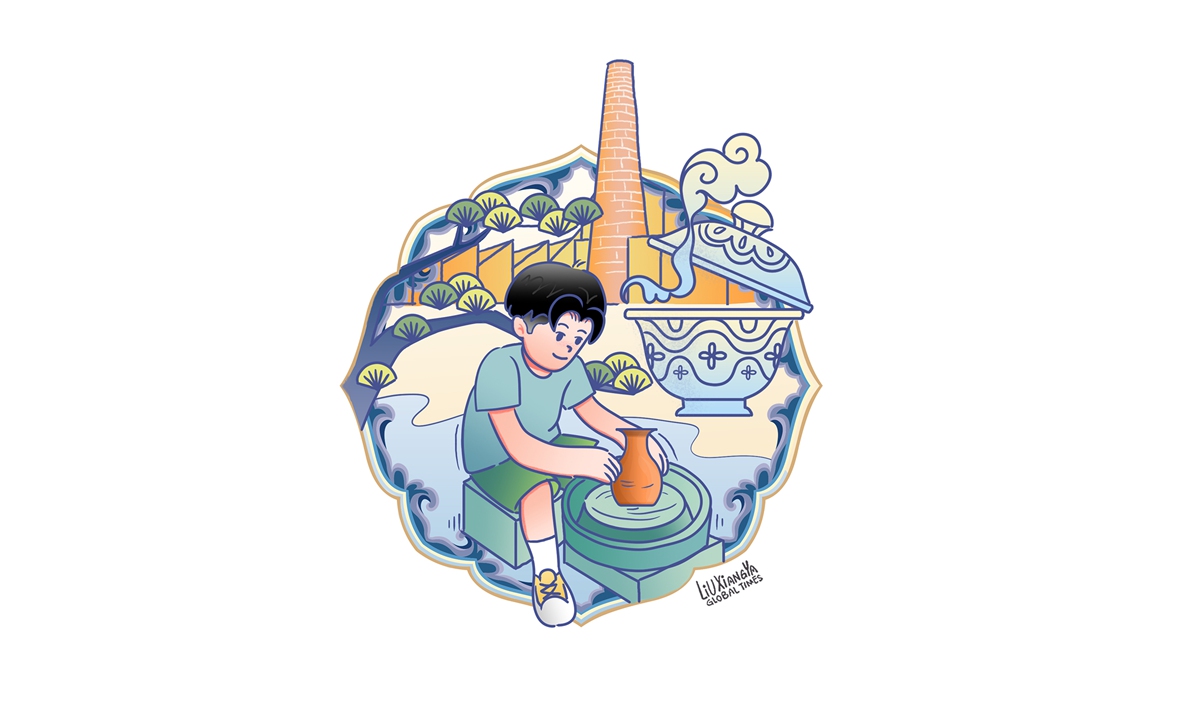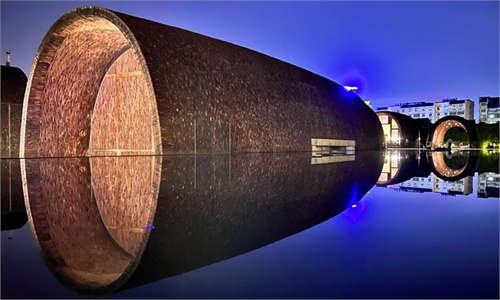ARTS / CULTURE & LEISURE
Youth in Jingdezhen embrace glorious history, splendid present

Illustration: Liu Xiangya/Global Times
You may be familiar with the terms Beipiao and Hupiao, or Beijing drifters and Shanghai drifters, but have you ever heard about Jingpiao, non-locals working and living in Jingdezhen, a small city in East China's Jiangxi Province that is famous for its ceramic industry. China is known as the country of porcelain, and the capital of the porcelain industry is in Jingdezhen. Currently, more than 30,000 out-of-towners from around China and even abroad have chosen to start their life here, seeking freedom and a deeper appreciation for the history and culture of the city.
The internet has seen many Utopian stories and legends happening here. Unlike drifting in a mega city, which brings stress in terms of both work and cost of living, for only a few hundred yuan a month you can get a rather cozy place to live in Jingdezhen, study ceramic craftsmanship from scratch, and start making works that people can sell on the market or after they set up an art studio. In Jingdezhen, it seems possible for people, especially the young, to initiate another lifestyle and realize their dreams.
So, what makes Jingdezhen so attractive to many young people? To begin with, there is the sound environment for starting a business. Jingdezhen is the "porcelain capital" of China. The fact there is a complete industrial chain covering 72 traditional porcelain-making processes, from purchasing raw materials to firing porcelain, makes it convenient for start-ups. As to learning the craft, there are a variety of ceramic art courses on offer, ranging from 7-day primary level to 30-day advanced courses. In addition, there are large numbers of craftsmen who can help hone your skills step by step, teaching you how to mold, shape, decorate and fire a clay body in the kiln.
Generally, the last step is to sell what you have made. As early as a decade ago, non-local artists brought designer culture to Jingdezhen and over the years the market has become mature and prosperous. Setting up stalls is recognized as a good way to display and market one's wares. Located in the Taoxichuan Ceramic Culture Creative Park, Taoxichuan Market, which was transformed from an old factory, has become an extremely popular designer market. Every weekend and holiday, tourists and professional buyers flock to the market, where excellent works quickly sell out. Applying for a booth is easy, and rent remains cost-effective. From market stalls to livestream e-commerce and intelligence workshops, measures to serve the industry in Taoxichuan are continuously upgraded to improve the incubation chain and meet the needs of start-ups at different stages.
At the government level, Jingdezhen is also putting in more effort. In 2022, Jingdezhen issued the document "Several Measures to Promote Further Innovation and Entrepreneurship of Jingdezhen Talents," which points out that "Jingdezhen talents" are the most distinctive, potential, and influential talent force in the Jingdezhen National Ceramic Culture Inheritance and Innovation Pilot Zone. The document also lists various specific measures, such as providing monthly subsidies for college graduates who start a business in Jingdezhen. Moreover, artists enjoy a favorable atmosphere for creation in the city. Just like the beautiful high-temperature chemical reaction between clay and glaze through which ceramics are produced, Jingpiao can feel the dynamics of today's contemporary ceramic art in which old and new elements collide and create a pure and inclusive atmosphere.
It is not only favorable to start a career here, but also a great place to enjoy a freestyle life. You can move at your own pace and arrange your time however you wish.
Jingdezhen is not a big city, so if you want to meet with friends, you do not have to waste too much time on the road. Enjoying dinner or snacks together, friends chat about their life experiences, philosophy, creative ideas, and even the stars and universe.
Embracing a glorious history and its splendid present, Jingdezhen culture, like the Chinese culture to which it belongs, features inclusiveness and openness and thus accommodates and welcomes people worldwide. Upon the arrival of numerous Jingpiao who continuously nourish local ceramic culture, the city has changed from an ancient town for traditional ceramic craftsmanship to a modern, international place of innovation. This balanced integration of traditional craftsmanship, contemporary art, and infinite creativity is a vibrant explanation of Chinese culture's identity and its unique contribution to world culture.
The author is a faculty member with the School of Applied Economics, Renmin University of China. life@globaltimes.com.cn

